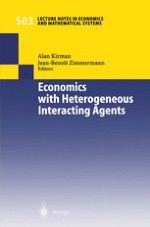2001 | OriginalPaper | Chapter
Coalition Formation with Heterogeneous Agents
Authors : Davide Fiaschi, Pier Mario Pacini
Published in: Economics with Heterogeneous Interacting Agents
Publisher: Springer Berlin Heidelberg
Included in: Professional Book Archive
Activate our intelligent search to find suitable subject content or patents.
Select sections of text to find matching patents with Artificial Intelligence. powered by
Select sections of text to find additional relevant content using AI-assisted search. powered by
The paper analyzes a game of coalition formation in which agents with limited computational abilities possess heterogeneous endowments and seek to coax lesce into groups to produce and divide an output. The basic game is modelled as a two stage game; in the first stage every agent sends other agents various messages consisting in the proposal of a coalition. In the second stage, knowing the coalitions, agents choose the actions to perform. We show that there exists at least a Strong Nash equilibrium characterized by the consecutive property, i.e. the richest agents form a coalition among themselves and so do the poorest agents. The numerical simulations show that agents play the SNE with high probability; moreover, the more unequal the initial distribution of resources, the lower the average utility in the economy. The transition paths highlight the fact that the rich agents are the first to coalesce, so that the inequality of individual utilities increases in the early periods and then decreases when poor agents also start coalescing. In contrast, average utility is generally increasing, so that there exists a non linear relationship between inequality and average utility.
